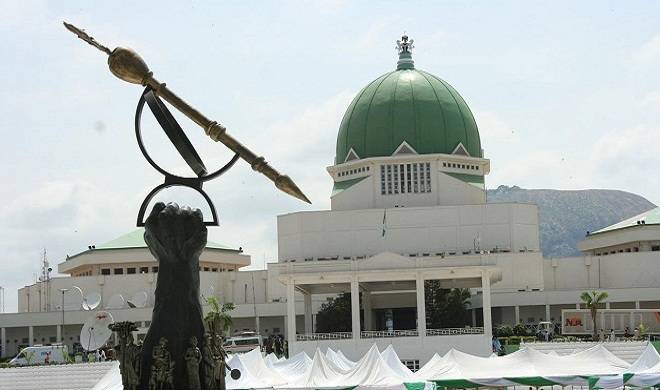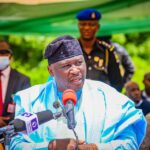Call it shadow-boxing before the real game, if you like. But the ongoing tussle for the offices of the President of the Senate and the Speaker of the House of Representatives of the yet to be constituted Ninth National Assembly offers implications that are far more than pertain to a shadow-boxing exercise. An ongoing traditional Orientation Programme by the National Assembly bureaucracy, for newly elected legislators has been hijacked as the perfect turf for interfacing them with returning legislators and thereby provide the perfect forum for politicking over the leadership of the incoming federal legislature, ahead of its actual take off. And as things stand, the course of the drama will largely determine what will be here after, both for the central legislature and the rest of the country’s politics.
At the last count the leading issues included the directive by the ruling APC to its members to adopt block votes for the party’s anointed candidates namely Ahmed Lawan for Senate President and Femi Gbajabiamila for Speaker House of Representatives. Incidentally while many of the party faithful are already falling in line with the reported adoption of these two by the APC some others in the party are still pressing on with their aspirations for the seats in both the Senate and House. Of particular interest is the case of a leading light of the party – Ali Ndume, whose bid now enjoys a formal media push with paid newspaper pages actually celebrating his plans for the Red Chamber if elected. Likewise, in the House is the undimmed aspirations of some eligible members including Umar Bago Mohamed from Niger State.
In the light of the circumstances, several permutations are on the cards including the following. In one vein there is the possibility that the APC may eventually have its way in imposing its anointed leadership on the National Assembly. If that happens, it will be a resounding victory for party supremacy in the affairs of the APC, and signpost a telling success for the party’s National Chairman Adams Oshiomhole, who has since his resumption of office in July 2018, kept no one in doubt over his interest in such. For many agree that since its emergence on the country’s political terrain in February 2013, party supremacy has remained the ‘Achilles Heel’ of the APC.
However, opponents of the party’s sway over the leadership politics of the NASS, including some of its members refer to such a scenario as the ‘reign of clones’ over the Ninth National Assembly. This is a veiled, uncomplimentary reference to fears that with such a development, the NASS will be tele-guided from outside and ostensibly the leadership of the APC.
In another vein, the provisions of the Constitution and the respective Standing Rules of both Chambers of the NASS which provide for all legislators in any chamber to vote for its leadership, offer the opposition parties (with the PDP in the lead), the opportunity to deploy their numbers to try to vitiate the APC agenda.
Meanwhile the tussle also provides a throwback to the politics especially the factor of party supremacy, which facilitated the emergence of leadership of the country’s legislative establishment from antiquity. Nigeria’s proper national legislature as an independent country commenced in 1959, in the wake of the demise of the colonially appointed Legislative Councils (LEGCO – the last of which was in 1956). Interestingly, even under the yoke of colonial tutelage, Nigerian politics was run under the aegis of party supremacy. The parties provided general guidance to and cohesion among political actors in the public domain.
The 1960 Parliament which was modeled after the British Westminster model, was designated the Independence Parliament and ushered in the country’s independence that year. It lasted until 1963 when the country became a republic and was re-designated the Republican Parliament without any fresh polls. The Republican Parliament was to lapse constitutionally in four years by 1967, but its life was truncated in January 1966 by the country’s first ever military coup of that year.
With the return to democratic governance in 1979, the country changed its legislative system from the Westminster model to the Presidential system and set up the First National Assembly (1979-’83) with pronounced supremacy of the ruling National Party of Nigeria (NPN), in the running of the government. This was even as the NPN was to go into a partnership with the Nigerian Peoples Party (NPP) to run the government.
The Second National Assembly (1983-’83), was toppled just three months into that same year with the Third National Assembly (1990-93), coming seven years after, during the military administration of General Ibrahim Babangida, when the government created by fiat, two official political parties namely the National Republican Convention (NRC) and the Social Democratic Party (SDP). Not a few political pundits easily blame the Babangida dispensation for seeding the erosion of party supremacy in the country’s political landscape, as the parties so created by his administration were virtually government parastatals which were seen as hollow, artificial political platforms.
The Fourth NASS (1999-’03) came on board with the country’s last return to civil rule in the era of former military Head of State, President Olusegun Obasanjo, and was smarting from the harsh lessons from its preceding Third NASS, as its ranks were dominated by a mixed multitude of traditional, full time politicians and retired military top brass. Needless to state that it was in a situation that did not facilitate party supremacy in the affairs of governance. President Olusegun Obasanjo adopted an authoritarian style of swinging the affairs of the ruling PDP, especially with respect to producing and controlling the leadership of the NASS according to his personal predilection. When the Fifth NASS (2003-’07) came also during the Obasanjo era, his earlier style of overriding party supremacy and interfering in the leadership politics of the NASS continued.
The emergence of the Sixth NASS (2007-’11) was a classic manifestation of Obasanjo’s larger than life status as its leadership was orchestrated by a PDP Legislative Agenda Committee of which he, even then officially out of office as President, was Chairman and then incoming Vice President Dr Goodluck Jonathan was Secretary. That Committee planted the entire leadership of the PDP controlled legislatures from the NASS to the states across the country. It was that politics that produced David Mark as Senate President and Patricia Etteh as Speaker House of Representatives.
The Seventh NASS (2011-‘15) came during the Goodluck Jonathan era with more drama in the House than in the Senate which had a rather stabilized David Mark in his second term as Senate President. It was then that the PDP was taken to task in trying to impose party supremacy only to fail in the attempt to stop Aminu Tambuwal and Emeka Ihedioha from becoming Speaker as well as Deputy Speaker respectively.
The topical lessons for the APC during the 2015 leadership politics of the current Eighth NASS (2015-’19), when the party lost the critical office of the Deputy Senate President to its rival PDP over intractable issues bordering on party supremacy, are still fresh in mind. With the early skirmishes so far executed, the last has not been heard of the politics of the emergence of the leadership of the Ninth NASS.
How the APC will address the twists and turns of the ongoing drama remains the next episode in this long-drawn process of producing the next generation of leaders for the country’s central legislature.

 Join Daily Trust WhatsApp Community For Quick Access To News and Happenings Around You.
Join Daily Trust WhatsApp Community For Quick Access To News and Happenings Around You.


